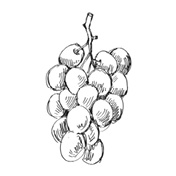
Is winemaking an art? Is writing an art for that matter? It can be but rarely is. A discipline or craft is closer to the work in 99.99 percent of the practice and practitioners in either wine or writing. Nothing is more evanescent than the ancient aesthetic tests of range, durability, resonance, the stark requisites of beauty.
Some of us are waiting for a future puff piece called “The Hundred Best Wines of South Dakota,” but then how can you blame a mid-range geezer with discretionary capital who may have exhausted his interest in golf, adultery, or fishing and hunting for waking up one spring morning and saying to his wife, “Ethel, I think I’ll plant some grapes.” (He may even think you plant ripe grapes at this stage.) It’s an ancient urge. On a more basic level in many rural areas I’ve lived in or visited I’ve been asked to taste some bumpkin’s apple, strawberry, cherry, or rhubarb wine. This is frankly not a pleasant experience. You’re standing in the parlor and there’s no place to spit. At least when you move up the economic food chain you are dealing with varieties of grapes.
In America there’s always been a touching effort to democratize the arts. As humans we are seemingly genetically immodest. We are always trying to discover our hidden and miraculous potential. A young lout like I once was reads a Shakespeare or Keats poem and says, “I’m going to write me a poem just like that.” A mogul with an especially fat wallet tastes a Cheval Blanc, a Clos de la Roche, a Romanée-Conti, or even a Côte-Rôtie, or Heitz Martha’s Vineyard, and says to himself, “I can do this.”
Only he can’t. He’ll probably forever bear the same relationship to fine wine as a publisher does to fine writing. If he produces a passable wine, assuming he owns good earth, he’ll attend award ceremonies but everyone there will know that someone less well tailored on the back row has put the “juice” together, as it were. There is nothing so irascibly difficult as making a truly fine wine, given a thousand unpredictable variables. Just watching the weather would be like three months of labor pains.
There’s also the question of why anyone who knows publishing, or the art, food, or wine world for that matter, would wish to be an “artist.” At best it’s a calling that happens when you’re young. And so often in winemaking the calling is hereditary. You might during a pleasant evening tasting the ten best wines of the world wish to call the man most directly responsible for each an “artist,” but if I were him I’d rather be called a “fine winemaker.” In an age when every third athlete is called “great” what do we have left for the Sistine Chapel or Dostoevsky? There is no more uneven ground than the field of the arts.
There are marvelous semi-comic aspects to the problem. Wine magazines and the wine press in general offer tip sheets like those you buy when entering the grounds of Aqueduct, Churchill Downs, or Santa Anita. Many of us stay removed other than at a nominal level from wine pundits because we wish to make our own discoveries, draw our own conclusions. The furthest thing from my own aesthetic judgments is the world of numbers, let alone price. I am admittedly an outsider, a mere consumer, but wine simply can’t be graded like a teacher grades term papers. In writing, Ezra Pound advised against giving credence to someone who hadn’t produced a notable work. If there was a system that directly involved the hundred best winemakers in the world I would subscribe, but these men are far too busy. Meanwhile I see hot new California wines highly touted that remind me of Rose Bowl floats that are garish and silly and doomed to last no longer than their plucked roses.
Is winemaking an art? Maybe for a few, and their identities are somewhat concealed except to a few. The apprenticeship requires the entire life. You often have to wait twenty years or more beyond the publication or release date to have any idea if art has been “committed” despite the immediate reviews. Ultimately you are working in a medium that is rarely understood beyond the immediate sensation of pleasure. Like a fine chef’s your work reaches fruition only when it disappears into someone’s mouth.